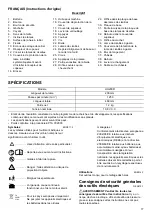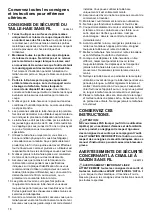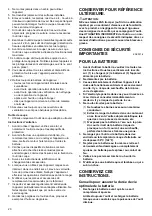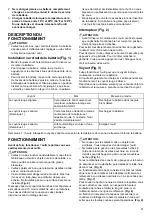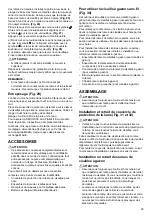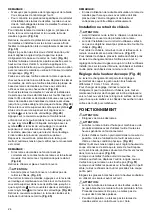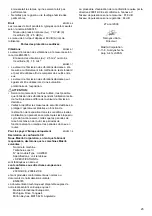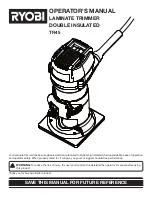
11
Personal protective equipment
1. Dress Properly. The clothing worn should be
functional and appropriate, i.e. it should be tight-fitting
but not cause hindrance. Do not wear either jewelry or
clothing which could become entangled. Wear
protective hair covering to contain long hair.
2. Wear eye protection and stout shoes at all times while
operating the machine.
Electrical and battery safety
1. Avoid dangerous environment. Don’t use the
equipment in damp or wet locations or expose it to
rain. Water entering an equipment will increase the
risk of electric shock.
2. Recharge only with the charger specified by the
manufacturer. A charger that is suitable for one type of
battery pack may create a risk of fire when used with
another battery pack.
3. Use power tools only with specifically designated
battery packs. Use of any other battery packs may
create a risk of injury and fire.
4. When battery pack is not in use, keep it away from
other metal objects, like paper clips, coins, keys, nails,
screws or other small metal objects, that can make a
connection from one terminal to another. Shorting the
battery terminals together may cause burns or a fire.
5. Under abusive conditions, liquid may be ejected from
the battery; avoid contact. If contact accidentally
occurs, flush with water. If liquid contacts eyes,
additionally seek medical help. Liquid ejected from the
battery may cause irritation or burns.
6. Do not dispose of the battery(ies) in a fire. The cell
may explode. Check with local codes for possible
special disposal instructions.
7. Do not open or mutilate the battery(ies). Released
electrolyte is corrosive and may cause damage to the
eyes or skin. It may be toxic if swallowed.
Starting up the equipment
1. Make sure that there are no children or other people
nearby, also pay attention to any animals in the
working vicinity. Otherwise stop using the equipment.
2. Before use always check that the equipment is safe
for operation. Check the security of the cutting tool
and the guard and the switch trigger/lever for easy and
proper action. Check for clean and dry handles and
test the function of the start/stop.
3. Check damaged parts before further use of the
equipment. A guard or other part that is damaged
should be carefully checked to determine that it will
operate properly and perform its intended function.
Check for alignment of moving parts, binding of
moving parts, breakage of parts, mounting, and any
other condition that may affect its operation. A guard
or other part that is damaged should be properly
repaired or replaced by our authorized service center
unless indicated elsewhere in this manual.
4. Switch on the motor only when the hands and feet are
away from the cutting tool.
5. Before starting make sure that the cutting tool has no
contact with any objects.
Method of operation
1. Only use the equipment in good light and visibility.
During the winter season beware of slippery or wet
areas, ice and snow (risk of slipping). Always ensure a
safe footing.
2. Take care against injury to feet and hands from the
cutting tool.
3. Never stand on a ladder and run the equipment.
4. Never climb up into trees to perform cutting operation
with the equipment.
5. Never work on unstable surfaces.
6. Remove sand, stones, nails etc. found within the
working range. Foreign particles may damage the
cutting tool and can cause dangerous kick-backs.
7. Should the cutting tool hit stones or other hard objects,
immediately switch off the motor and inspect the
cutting tool.
8. Inspect the cutting tool at short regular intervals for
damage (detection of hairline cracks by means of
tapping-noise test).
9. Before commencing cutting, the cutting tool must have
reached full working speed.
10. The cutting tool has to be equipped with the
appropriate guard. Never run the equipment with
damaged guards or without guards in place!
11. All protective installations and guards supplied with
the equipment must be used during operation.
12. Always remove the battery cartridge from the
equipment:
- whenever leaving the equipment unattended;
- before clearing a blockage;
- before checking, cleaning or working on the
equipment;
- after striking a foreign object;
- whenever the equipment starts vibrating abnormally.
13. Always ensure that the ventilation openings are kept
clear of debris.
Cutting Tools
1. Employ only the correct cutting tool for the job in hand.
Maintenance instructions
1. The condition of the equipment, in particular of the
cutting tool of the protective devices must be checked
before commencing work.
2. Turn off the motor and remove the battery cartridge
before carrying out maintenance, replacing cutting
tools or cleaning the equipment or cutting tool.
3. Check loose fasteners and damaged parts such as
cracks in the cutting attachment.
4. Follow instructions for lubricating and changing
accessories.
5. When not in use, store the equipment indoors in dry
and high or locked-up place - out of the reach of
children. Clean and maintain before storage.
6. Use only the manufacturer’s recommended
replacement parts and accessories.
7. Inspect and maintain the equipment regularly,
especially before/after use. Have the equipment
repaired only by our authorized service center.
8. Keep handles dry, clean and free from oil and grease.
KEEP FOR FUTURE REFERENCE
WARNING:
DO NOT let comfort or familiarity with product (gained
from repeated use) replace strict adherence to safety
rules for the subject product. MISUSE or failure to
Summary of Contents for UH200DZ
Page 2: ...2 1 2 3 4 5 6 7 8 1 2 3 4 5 6 7 8 9 ...
Page 3: ...3 9 10 11 12 13 14 15 16 10 11 12 13 14 15 16 17 18 19 20 17 ...
Page 4: ...4 17 18 19 20 21 22 23 24 21 22 23 22 17 23 24 25 22 26 25 27 28 29 30 16 31 ...
Page 5: ...5 25 26 27 28 29 30 21 18 17 32 18 33 34 35 36 37 ...
Page 6: ...6 31 32 33 34 35 36 37 38 23 37 16 22 17 23 16 23 24 25 27 25 22 26 30 29 28 ...
Page 7: ...7 39 40 41 42 43 44 17 18 32 18 16 17 18 19 20 17 23 22 ...
Page 8: ...8 45 46 47 48 49 50 51 36 38 37 39 40 37 39 40 37 ...
Page 88: ...ALA Makita Corporation Anjo Aichi Japan 884948 999 ...

















